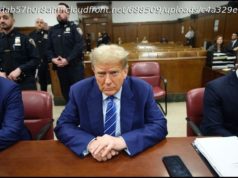Americans hoping for guidance on whether Trump’s executive order was really a Muslim ban are left scratching their heads: Our view
The Supreme Court has only added confusion to President Trump’s stubborn and — until now — futile effort to temporarily bar visitors from certain Muslim-majority countries. The justices partially resuscitated Trump’s plans to ban visitors from Iran, Libya, Somalia, Sudan, Syria and Yemen for 90 days, and gave both sides plenty to crow about.
Americans hoping for some guidance from the high court on whether Trump’s action was in reality a Muslim ban, something he promised voters he would deliver once elected, were left scratching their heads.
Two federal appeals court had taken Trump at his word during his campaign rallies and halted the ban, one on grounds that it violated immigration law, and the other that it violated the Constitution. The 4th Circuit Court of Appeals said that in the context of Trump’s heated rhetoric toward Muslims, his travel-ban executive order “drips with religious intolerance, animus and discrimination.”
But the Supreme Court ignored that particular elephant in the room and split the difference. Pending a full hearing in the fall on the merits of Trump’s order, his 90-day ban on visitors from the six countries and his 120-day ban on all refugees was allowed to proceed — but not for visitors or refugees who have a “a bona fide relationship with a person or entity in the United States.”
Baffled? So is everyone else. The White House called it a “clear victory.” Civil rights lawyers for immigrants and their families, however, said it would impact a small number of people seeking entry to the United States.
“I fear the court’s remedy will prove unworkable, ” Justice Clarence Thomas wrote in a partial dissent, adding it will “invite a flood of litigation.”
He’s probably right.
The whole enterprise has been a mess right from the start. The first version of the president’s travel ban, issued Jan. 27, was so deeply flawed that it had to be rewritten. Even as White House lawyers argued for the legitimacy of the newer version, Trump tweeted that it was only a “watered down, politically correct” variation of the original.
And it was arbitrary. Since before 9/11, no terrorist from any of the six countries has launched a fatal attack against the United States. The Department of Homeland Security’s own internal reviews find that immigrants from those countries pose no unique threat. Moreover, attacks in America are increasingly from among the native-born.
Presidents usually have wide discretion when it comes to immigration restrictions. But Trump’s own rhetoric about Muslims got him in trouble with the appeals courts. By the time the Supreme Court hears the case in full in the fall and issues a ruling months later, the 90-day ban on visitors and 120-day ban on refugees will have likely ended. The debate over whether Trump acted illegally and violated First Amendment safeguards against religious discrimination could be moot.
However, Trump’s executive order made room for him to extend his ban. A misguided policy may finally have its day of reckoning.
USA TODAY’s editorial opinions are decided by its Editorial Board, separate from the news staff. Most editorials are coupled with an opposing view — a unique USA TODAY feature.
To read more editorials, go to the Opinion front page or sign up for the daily Opinion email newsletter. To respond to this editorial, submit a comment to letters@usatoday.com .






